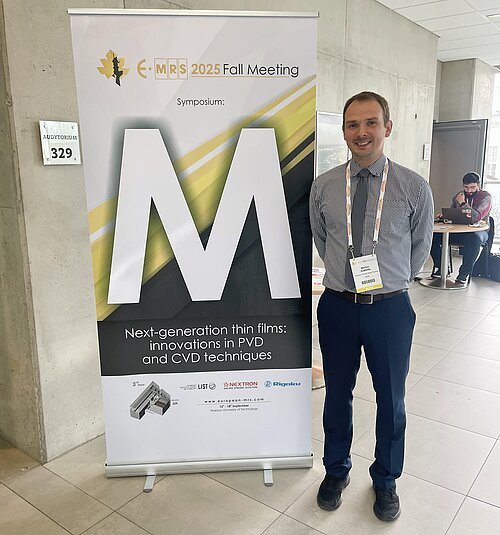
Title: Expanding frontiers in scalable deposition technologies for next-generation mixed anion thin films
Research proposal No: 1.1.1.9/LZP/1/24/011
Duration: 01.07.2025.-30.06.2028.
Project Leader: Dr.phys. Mārtiņš Zubkins, Institute of Solid State Physics University of Latvia (ISSP UL)
Total budget: 184 140 EUR
European Regional Development Fund (ERDF) funding: 156 519 EUR
State budget funding: 18 414 EUR
ISSP UL budget: 9 207 EUR
Project description:
Mixed-anion thin films possess unique structural and functional properties, making them promising materials for various innovative applications such as smart windows, photocatalysis, and energy technologies. The aim of this project is to develop scalable deposition technologies for fabricating next generation mixed-anion thin films with tailored functional properties. By creating sustainable, scalable coating methods, the project supports Latvia’s Smart Specialisation Strategy (RIS3) priorities – 3. Smart materials, technologies and engineering systems; and 4. Smart energy.
The planned activities include: (i) deposition of mixed-anion thin films at lab scale using magnetron sputtering, including nanostructuring and optimisation of deposition parameters; (ii) characterisation of structure, chemical composition, and functional properties using advanced techniques to provide feedback for synthesis; and (iii) scaling up the deposition process to produce high-quality, uniform coatings over large areas.
Expected outcomes include the deposition of yttrium oxyhydride (YHO) and transition metal oxynitride (e.g., TaON, Ti3O3N2, Zr3O3N2) thin films with improved properties, detailed understanding of structure–composition–property relationships, and the development of a scalable deposition protocol suitable for industrial applications. The project will expand the range of thin films with novel functionalities, advance large-area coating technologies, and contribute to the postdoctoral researcher’s professional growth by enhancing skills, knowledge, and research capacity, thereby fostering scientific excellence. Four scientific papers will be published in journals indexed in Web of Science and Scopus databases, and a new thin film deposition technology will be developed and patented. The research will be conducted at the Thin Films Laboratory of the Institute of Solid State Physics, University of Latvia (ISSP UL), a leading institution in the fields of materials science and solid-state physics.
PROJECT PROGRESS
Time period: 01.07.2025. - 30.09.2025.
During the project implementation, yttrium oxyhydride (YHO) thin film samples were prepared on various substrates using the magnetron sputtering method. Glass, single-crystalline yttria-stabilised zirconia, silicon, and sapphire (c-plane Al2O3) substrates were used in the studies. The samples were produced to determine their chemical composition, structure, vibrational spectra, and photochromic effect. A solar simulator was used to characterise the photochromic effect by analysing the colouring and bleaching dynamics of the films.
A presentation titled “Role of hydrogen dynamics and deposition conditions in photochromic YHO/MoO3 bilayer films” was delivered at the international conference E-MRS Fall 2025 (15–18 September), Warsaw, Poland. Participation in the conference promoted the visibility of LU CFI research, facilitated new collaborations (for example, with the Helsinki Accelerator Laboratory), and provided up-to-date insights into the development trends of functional coatings, directly supporting the project objectives.
In addition, participation in the RAC International Summer School (24–31 August) on diffraction and spectroscopy methods in materials science (Tallinn, Estonia) contributed to the expansion of international contacts, and the acquired skills will be applicable in the project implementation.
